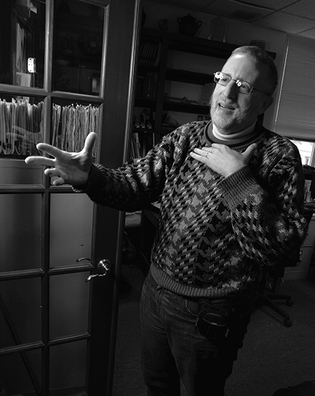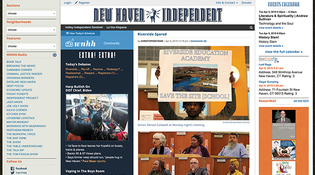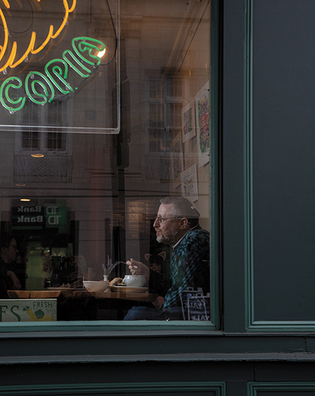 loading
loading
featuresThink locallyAs creator of the online New Haven Independent, Paul Bass '82 has helped reinvent civic journalism. Norman Oder ’83, ’90MSL, is a freelance journalist in Brooklyn.  Mark OstowAs small-city newspapers shrink or disappear, Paul Bass ’82 has found a nonprofit model for robust coverage of local issues. View full imageFor three days last August, something shocking happened on the New Haven Green. Dozens of people, some of them homeless, were keeling over. Paramedics took 47 people on 120 hospital trips. The devastation from a notably potent batch of K2, sometimes called synthetic marijuana, drew national notice. But the most in-depth press coverage came from the New Haven Independent, a scrappy nonprofit online publication founded and edited by Paul Bass ’82. Soon after Bass got a text from a city government source, he rushed to the Green, conducting interviews and filming for Facebook Live. He hustled back to his nearby office to post an article, which was subsequently updated at least ten times. The Independent followed up with articles, press conference video, and discussion on “Dateline New Haven”—a daily public-affairs show Bass hosts on the radio station he founded, WNHH. “We have to figure out how we’re going to manage our public spaces,” Bass told Connecticut Public Radio not long afterward, “but also how we’re going to address the root of the problem.” And the Independent kept following up, covering the debate about an unusual opioid treatment program and the city’s use of data to better track overdoses. Such sustained attention is the hallmark of the Independent, which, since its founding in 2005, has become the city’s crucial chronicler and online public square. If seismic shocks to the journalism business have turned some cities into news deserts, New Haven offers a counter-example, giving readers “the tools of democracy,” as Bass puts it. With a small staff and a budget of $420,000, the Independent has had a big impact, catalyzing school reforms, new police recruitment practices, a change in city towing policies, and safer street design. Deep coverage of topics such as lead paint poisoning and the city’s bus system emerge not from a special investigative team but from shoe-leather reporting, guided by Bass’s long experience of New Haven. The Independent also covers civic meetings, business openings, and neighborhood news in granular detail, aiming not at what Bass calls “broccoli journalism”—healthy but tasteless—but at the rather more savory “broccoli rabe.” Both policy discussions and heated arguments are meticulously quoted. Compared with snazzier news sites, the Independent resembles a blog: a regular cascade of articles, plus one sidebar for smaller stories. Articles are edited quickly, so typos sneak through. (In an ongoing competition, readers who spot the most win an NHI coffee mug.) Though the Independent publishes no masthead editorials and few opinion essays, its comments section, moderated carefully by Bass and the staff, is remarkably robust. Frequent commenters become mini-celebrities. When one of them, Rebecca Turcio (known by her user name, Cedar Hill Resident), died recently, she was eulogized in the Independent for her neighborhood activism, which she began in the site’s comments section. Perhaps most importantly, the Independent has helped build community. Reading it has “really homegrown me,” says 15-year resident Khalilah Brown-Dean, a political science professor at Quinnipiac University who chairs the board of the Community Foundation for Greater New Haven (which helps fund the Independent). Its coverage, she adds, breaks down barriers in a city cleaved by class, race, town-gown, and even tenure of residency. The Independent served as Exhibit A in the 2013 book The Wired City: Reimagining Journalism and Civic Life in the Post-Newspaper Age, by Northeastern University journalism professor Dan Kennedy. Since then, Bass has expanded in several ways, adding arts coverage, deploying Facebook Live video, and, in 2015, launching the low-power radio station. Accessible via broadcast, podcast, and video, WNHH’s shows cover public affairs, arts, and activism, with hosts, guests, and topics that reflect the diversity of a city with a large black and Latino population. (The radio station and a partner publication covering the lower Naugatuck Valley have their own budgets; all three are under the umbrella of Bass’s nonprofit, the Online Journalism Project.) Larger online nonprofit news outlets, such as the statewide Texas Tribune and Vermont’s VTDigger, may have broader impact. But the Independent’s depth sets it apart, says Kennedy, who lauds the site for “taking on a medium-sized urban community and just covering the hell out of it.” “I think it’s clearly one of the best established” born-digital news sites, says Alberto Ibargüen, president and CEO of the John S. and James L. Knight Foundation in Miami, which has helped fund the Online Journalism Project. He calls the site’s work “absolutely essential to democracy.”
 The New Haven Independent (home page, above) features in-depth coverage of New Haven politics, schools, and community affairs. View full imageAfter editing articles each morning from his Westville home and finishing his morning prayer (an observant Jew, he describes himself as “Conservadox”), Bass walks downtown. He makes a daily pre-office trip to the Hall of Records, checking for listings of governmental meetings that may not have been announced online. He can’t climb a staircase there or walk a block without encountering someone who says hello, offers a comment, or shares a tip. Bass’s strong connection to New Haven goes back more than 40 years, to his arrival at Yale from White Plains, New York, in 1978. He had already embraced the opportunity reporting gave him to explore and expose, but, he says, “my love for journalism deepened at Yale.” He was a prolific reporter at the Yale Daily News (where he and I became friends). As an undergrad, Bass also wrote for the mainstream daily New Haven Register and the alternative weekly New Haven Advocate, which wrapped ads for head shops and concerts around aggressive journalism. In a nonfiction writing seminar taught by the author John Hersey ’36, he learned that “the work is what matters, not the status.” Bass also fell in love with New Haven, which, he reflected at a tea at Pauli Murray College in October, is “a small enough place that you can make a difference quick, and can feel like you’re a part of it, and a big enough place that it’s really interesting.” While still a student, Bass first began unraveling urban chicanery in a 1981 Advocate piece about the New Haven Coliseum. Another reporter—constrained from truth telling by his employer—tipped Bass off about a quid pro quo involving an effort to retain the local minor-league hockey team. Remarkably, but not atypically in Bass’s career, the alderman he exposed as a beneficiary of mayoral largesse in the case would later become a confidant and source. “I’m here; I don’t leave,” says Bass, explaining his deep well of sources. “You have to still face people, know where they’re coming from, and write more stories.” In 1986, he and his wife Carole (Smith) Bass ’83, ’97MSL, with partners, founded a neighborhood-focused weekly newspaper, the original New Haven Independent. But a free print publication couldn’t sell enough advertising, and it folded after three years. Bass joined the Advocate staff, where he soon helped expose a major scandal in the city’s Democratic machine. In the late 1990s, he and Carole wrote the series “City for Sale,” which documented how mayoral aides unethically enriched friends and associates through government loans. The result: an FBI visit to City Hall, the firing of three aides, and a belated embrace of clean government by Mayor John DeStefano. Bass had a good run at the Advocate, which allowed him and later Carole to work part-time as they raised their two daughters, who are now adults. (Carole was a senior writer at the Yale Alumni Magazine from 2009 to 2015.) But he envisioned a new path. In 2004, he took a year off to write, with Yale political scientist Douglas Rae, a book about the 1970 trial of two Black Panther leaders in New Haven. Then, inspired by local news blogs and the notion that journalism might be viewed more as a utility than a business, Bass decided to revive the Independent in 2005 as an online publication. He raised money from two foundations and a philanthropist to support his salary and freelancers, aiming to write an article a day and link to other sources. But in New Haven’s shrinking media universe, the fledgling Independent, tethered neither to costly physical plant nor a daily print schedule, soon added staff and became indispensable. Today, the Independent has four full-timers, three part-timers, and at least five regular freelancers; they produce five to eight substantial stories each weekday, plus shorter items. Other staffers supported by the Online Journalism Project work on the Valley Independent Sentinel and WNHH. In a shrinking media landscape for local news, “covering a local zoning hearing or Board of Ed meeting had become the new radical act of journalism,” as Bass put it in his obit for the Advocate, which stopped publication in 2013. Indeed, no other news outlet regularly covered New Haven’s school board until the Independent—nudged by a reader comment—investigated board members’ attendance and reported that it reflected greater truancy than at a local high school. Bass will take out his phone and start recording if he sees cops harassing loiterers, or an auto-wrecking company using a public street as a junkyard. To former staffer Melissa Bailey ’04, his first hire, the latter episode exemplifies Bass’s eagerness to do everyday reporting, “fighting for transparency at his own peril, defending public access to public goods.” Independent coverage prompted a new state law, adopted in 2011, that protects citizens who record cops. Bass’s (and the Independent’s) relationship with the police is nuanced. A regular “Cop of the Week” feature celebrates officers who save lives or solve cases. “It’s tough, because we’re hard on them,” Bass says of the police, “but I have deep respect for them.” By now, he’s got dozens of police contacts, official and not. Bearded, vegan, and typically in jeans, Bass began his radio career by cohosting a New Haven talk show in the mid-1990s on WELI: he was the left-wing counterpart to right-wing firebrand Tom Scott. He says he’s “mostly a Bernie Sanders guy, but I disagree with [progressives] as much as anybody else when I write articles.” These days, he’s less concerned with ideology than with trying to understand how things work. “I think he’s interested in scrutinizing power,” says Mark Oppenheimer ’96, ’03PhD, a friend of Bass’s who directs the Yale Journalism Initiative. The Independent regularly documents the control that Yale unions exert over the city’s Board of Alders, for example, noting when new hotel projects get held up by the alders because they’re not unionized. Bass became observant in his early 30s, and Carole converted to Judaism at around the same time. He was motivated after experiencing Jewish ritual with their first daughter and the ensuing intellectual and spiritual quest. His faith connects him to the community, he says, and the Sabbath lets him recharge. He takes the prescription against lashon hara (derogatory speech) seriously; he muses, “we don’t seek to get an article at any cost.” Wary of quick-hit crime coverage, the anti-tabloid Independent won’t name those arrested, much less show their mugshots, unless they’re public figures or can tell their side. Even as it broke news while investigating the murder of Yale grad student Annie Le in 2009, the Independent maintained that policy—mindful of how the reckless identification of a “person of interest” in the 1998 killing of student Suzanne Jovin ’99 had damaged a faculty member’s reputation.
 Mark OstowHaving lived in New Haven since coming to Yale in 1978, Bass has been in the city almost as long as his vegetarian hangout, Claire’s Corner Copia. View full imageAs Bass shoulders the roles of editor/reporter, radio host/producer, and fund-raiser, all while earning just $77,000 a year, he mentors interns and inspires staffers. Markeshia Ricks, a 17-year veteran journalist who has been at the Independent since 2014, recently covered a meeting of city planners that lasted until 10 p.m.; she stayed up until 5:30 a.m. to write three articles. “It was fun,” she says. Go to dinner with Bass (Claire’s Corner Copia, kosher) and he’ll regularly duck out to “angle”—his term for scoping out a story’s focus—in a call or text exchange with a reporter. Bass says he’ll keep going “as long as I can raise the money.” The radio station, which launched with a two-year grant, has begun to stabilize its funding. And the Independent has begun coverage of neighboring Hamden. To Matt DeRienzo, vice president of news and digital content at Hearst Connecticut Media Group and until recently director of a national consortium of local online publishers, “this country needs 1,500 New Haven Independents.” But not every city is well positioned to support one. New Haven benefits, author Kennedy notes, by having “a foundation community that really understands the importance of local journalism.” Bass, who has built his own dream career, thinks technology and community connections can foster a golden age of journalism. “It’s the best time to be a reporter,” he says. “It’s not as easy to be a very important influential person, as some reporters sought to be in the late twentieth century.” It was a time, he says, when big corporations owned monopoly daily papers, and reporters “got complacent.” That may be the word that least describes Bass. “It’s just astonishing how much he gets done in a day,” observes ex-staffer Bailey. “It would take three people to replace him.”
The comment period has expired.
|
|